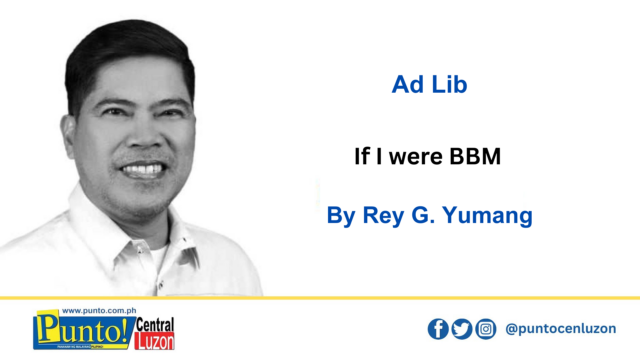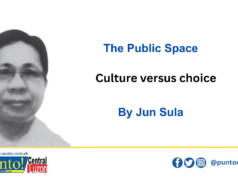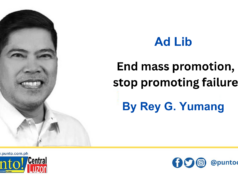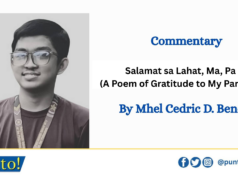A COUPLE of weeks ago, I met my former students from UP and quite expectedly, our usual trip down Palawe’s memory lane and banter over good food turned into our usual take on the current socio-political issues confronting the country.
For the record, no one from the group ever voted, or will ever vote for a Marcos. But considering the fact that we have set our expectations relatively low for BBM, and the bar was set equally low by Duterte, we were one in giving BBM a passing mark at this point in his term.
Nah! We haven’t changed colors or jumped ship as some would conveniently do. Frankly, we do not possess even an iota of cult mentality not to acknowledge something good or right, even if it were accomplished by someone we never liked or voted for.
At one point, we all agreed when someone suggested now is the time for BBM to seize the rarest opportunity in Philippine history so he could redeem not only his family’s name but also heal a nation scarred by dictatorship, corruption, and impunity.
In true Bob Barker fashion during the final question in the Miss Universe pageant, someone blurted out, “What would you do if you were the Philippine president?”
If I were BBM, I would first recognize that destiny has placed me in an extraordinary position not just as the son of a former president, but as the leader who can redeem the most controversial name in Philippine history. I would remind myself that this presidency is not merely a continuation of power, but a test of conscience.
If I were BBM, I would start by confronting the truth; not revising it. The Martial Law years (1972–1986) were not a “golden era,” as my paid revisionists and trolls claim. The government’s own Presidential Commission on Good Government has recovered ₱174 billion of the Marcos family’s ill-gotten wealth and estimates at least ₱125 billion more remain unrecovered. Thousands of Filipinos suffered under the dictatorship. According to Amnesty International, 70,000 were imprisoned, 34,000 tortured, and 3,240 killed. These are not rumors or propaganda but facts supported by court decisions and government records. Denying these facts is not leadership; it is deception.
If I were BBM, I would face the victims of Martial Law and their survivors and then say the words my family has never said: “I am sorry.” This apology, backed by restitution and reform, could begin a long-overdue process of national healing. This simple act of humility would not, in any way, weaken me. Rather, it would elevate me and show the world that the Marcoses are capable not only of leadership, but of moral courage.
If I were BBM, I would order the immediate settlement of the ₱203 billion estate tax that my family owes the Filipino people. Paying that debt would not only uphold the rule of law but also send a message that no one, not even the most powerful, is above it. After all, it is both a moral and legal obligation. This payment could fund thousands of classrooms, hospitals, and agricultural programs. What better way to demonstrate sincerity than by returning what rightfully belongs to the Filipino people?
If I were BBM, I would ensure that justice is not selective. The ongoing allegations of corruption in flood-control projects and government procurement must be investigated without fear or favor. There should be no “sacred cows,” no untouchables, not even within my circle. Corruption is not a legacy but a curse that has haunted every administration. As such, I would prove, with full conviction that accountability begins at home.
If I were BBM, I would rally my allies in Congress not to protect my power, but to pass lasting reforms such as strong anti-corruption and anti-dynasty laws, transparent governance systems, and mechanisms to safeguard human rights.
If I were BBM, I would not spend my presidency defending my father’s past but building a future worthy of forgiveness. The Philippines does not need another Marcos myth; it needs a Marcos who finally tells the truth.
If I were BBM, I would grab this once-in-a-lifetime chance to turn the Marcos name from a symbol of tyranny into a beacon of redemption. History is waiting, and so are the Filipino people.





